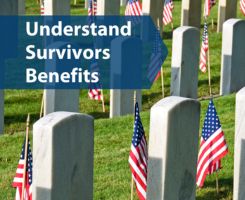Understanding VA survivors benefits and best practices for avoiding posthumous scams
When a Veteran passes away, it can be a difficult time. VA understands and is here to help with navigating through challenges.
VA honors the sacrifices of service members’ and Veterans’ dependents and survivors through many benefit programs, which may be available to a surviving spouse, dependent children and/or parents.
Surviving family members may be eligible for certain VA benefits and programs, such as financial assistance, home loans, education assistance, VA Dependency and Indemnity Compensation (DIC), or survivors pension.
Summary of Survivors Benefits
Dependency and Indemnity Compensation
Monthly payment for the eligible surviving spouse, dependent children or parent(s) of the Veteran or service member IF the Veteran or service member died in the line of duty or due to a service-related injury or illness.
Accrued Benefits
A one-time payment to a surviving spouse, dependent children or dependent parents of a deceased Veteran based on relationship when the record shows additional benefits (such as VA compensation or pension) may have been due to the Veteran prior to passing.
Burials and Burial Allowance
Burial benefits available include a gravesite in any of our National cemeteries with available space, opening and closing of the grave, perpetual care; a government headstone, marker, or medallion; a burial flag, and a Presidential Memorial Certificate, at no cost. Some survivors may also be eligible for a plot allowance, transportation allowance, and burial allowances based on the service-connected disability status of the deceased Veteran.
Final Monthly Payment
If a Veteran who is receiving VA compensation or pension benefits passes away, their last month of benefits can be paid to their surviving spouse.
Education and Training
Chapter 35 benefits and the Fry Scholarship are the two main G.I. Bill programs offering educational assistance to survivors and dependents of Veterans who died in the line of duty or as a result of service-related disabilities.
Home Loan Guaranty
Home loan benefits are available for surviving spouses receiving DIC. Spouses of deceased Veterans who were on the VA-guaranteed loan can refinance their VA loan to obtain a lower interest rate through VA’s Interest Rate Reduction Refinancing Loan (IRRRL).
If a surviving spouse is having trouble making their mortgage payments, VA can provide counseling to help avoid foreclosure—even if the loan isn’t a VA-guaranteed loan. Surviving spouses can contact a VA loan technician at 877-827-3702 anytime to discuss their loan. They can also send a message online through the home loan guaranty support portal.
Health Care
Survivors and dependents of Veterans may qualify for health care benefits, such as VA’s Civilian Health and Medical Program, which shares the cost of most health care services and supplies with unmarried surviving spouses and children.
VA Caregiver Support Program
Advance care planning allows the caregiver and the Veteran to make important health care wishes known in advance, including assigning a trustworthy individual to make medical decisions for the Veteran if they are not able to. An advance directive is crucial for ensuring that the wishes and preferences of both caregivers and the individuals they care for are respected, particularly in times of medical crisis or incapacity.
Timely reporting and posthumous scams
VA is committed to protecting the legacy of Veterans and their loved ones. Spreading awareness of the need for the timely reporting of a Veteran’s death and posthumous scams are two more of the many ways VA supports survivors.
Timely reporting to VA helps family members avoid posthumous scams, which can cause additional financial and emotional stress during an already difficult time.
To learn more, please visit: How To Report The Death Of A Veteran To VA | Veterans Affairs.
Best practices to avoid survivors benefits scams:
- Save important files such as the Veteran’s military service/treatment records, discharge papers, and copies of their VA claims.
- Go to the VA website for guidance on creating an account and obtaining a VA security Personal Identification Number (PIN) to securely access benefit information. A VA Security PIN is an additional way to secure direct deposit accounts from theft and protect Personally Identifiable Information (PII).
- Never give out PII via text, and be cautious of suspicious hyperlinks or unfamiliar hyperlinks.
- If a survivor is missing a VA benefits payment, identifies a discrepancy in payments, or finds suspicious activity with a direct deposit account, contact VA immediately at 800-827-1000.
- Review all documents thoroughly. Survivors should never sign a blank form for someone else to complete later. They should always review the completed form before signing and retain a copy of the completed form for their records.
- For protection against identity theft scams, notify the major credit bureaus (Equifax, Experian and TransUnion) to update the individual’s credit report with a deceased notice and notify the Veteran’s financial institutions so all accounts can be closed or transferred appropriately.
- According to AARP, scammers also use names published in obituaries to pretend to be long lost relatives of the deceased. When it’s time to write your loved one’s obituary, consider leaving out the birthdate, middle name, home address, birthplace, and mother’s maiden name.
- For other scams predators use, visit www.VA.GOV/VSAFE.
For more guidance on how to report the death of a Veteran, necessary documentation and survivor benefits resources available, visit VA Benefits For Spouses, Dependents, Survivors, And Family Caregivers | Veterans Affairs.
Article Resource: https://news.va.gov/131540/understanding-va-survivors-benefits-and-best-practices-for-avoiding-posthumous-scams/
